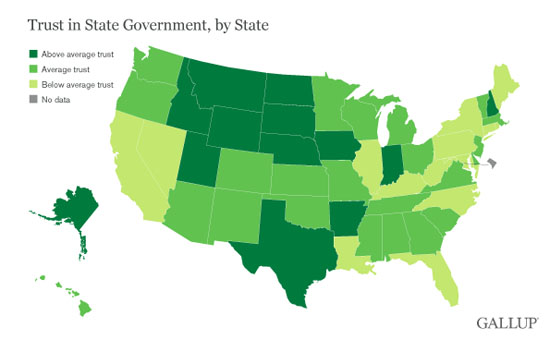According to Gallup, trust in state government runs highest among red states in middle and western America and lowest among blue states on the east coast (and Louisiana and California). The most untrusted state is Illinois, and it isn’t even close. Dave Schuler talks about Illinois.
Gallup tries to paper over the red/blue distinction in a couple of days, but neither of them exactly work. First, their methodology leaves Texas, Georgia, and Arizona as competitive. Arizona I can buy, Georgia is a stretch, but Texas? That can only be true if they are going strictly by partisan affiliation. I assume they are, and they should know better. Second, it’s not as though there aren’t lower-population states of both varieties that we can look at. Maine and Rhode Island are right after Illinois. Maine may be something of a special case because they had a quirk election that produced a governor who was immediately out of touch with his constituency, but the pattern is hard to ignore. Despite, as James Joyner says, the theoretical mistrust of government that occurs on the right.
So are conservative states better run? That’s a pretty subjective judgment. Though if you could demonstrate that their residents trust their government more, that would indeed be relevant.
I propose, however, an alternative explanation.
I suspect that for a non-trivial number of respondents, when asked “Do you trust your state government?” will implicitly think “Compared to what?” I mean, we all trust our government for some things and not for others. But if the answer of “Compared to what?” is “the federal government” then than likely explains a lot of the results. Texas has an independent streaks. Western states have a particular sense of being owned and operated by the feds. When you have mistrust or resentment of the federal government, the state government looks better by comparison. When your idealized version of government carries the sort of authority of the national government, then the state governments can look week and ineffectual by comparison. Oh, yeah, and it probably matters which party is the face of the national government.
This is, obviously, not all that’s going on. I suspect that there may be something to the population thing. If you look at blue states, Vermont and Delaware score higher than New York and Pennsylvania. Iowa and New Hampshire are the only blue (or blue-purple) states with an Above-Average rating. The pattern is less discernible among Republican states, however. But I think there is something to that, and perhaps an argument in favor of smaller rather than larger states. If we’re hyperconcerned about such things.
There are also particulars among various states. I mentioned Maine, but Louisiana and Illinois are particularly known for their corruption problems and it’s no surprise that they are both outliers in their own way. Minnesota is a bit of a surprise since I’ve always had the impression that Minnesotans take pride in their googoo inclinations, but only 11% trust their state government “a great deal” (compared to 16% of Wisconsinites). Maybe the frustration of high expectations? Minnesotans do tend to trust their state government a fair amount, though, with a good/fair rating of 62 (compared to 57 for Wisconsin). Idaho is another interesting case with only 9% trusting good but over half trusting fair (putting it in the top seven), which also makes sense because Idaho isn’t greatly run but is a hard state to govern and therefore tough to rely on. The same is true to a lesser extent of multiple large and rural states, though they might benefit from lower expectations in general.
For my own part, I would probably most of the states I’ve lived in with “Fair.” If asked to give a numerical value, it would likely have more to do with where I was within the state than anything. Some states are better run than others, I think, but outside of Illinois and Louisiana it’s pretty contentious. Different states have different challenges, as I’ve said. One of the easier markers, for me, on how much I trust my state government is how much the part of the state I live in is a priority. Even within the same state, my perspective in Idaho would probably differ depending on whether I lived in the relatively isolated northern part, Boise, or Mormon Idaho. In Utah, faith in the government might depend a fair amount on one’s religious faith, irrespective of one’s own actual political leanings.
One of the things that I find interesting is that the catalog actually seems to be less partisan than one might expect. It’s hard to say for sure since they don’t offer a partisan breakdown, but I would have expected even more of the states to be in the 40-60 range and dependent on whether it’s an opposite-party governor (like Wisconsin) or a governor of the major party (like most states). Instead, there do seem to be more factors at play than my cynicism would have suggested.
About the Author
3 Responses to Do You Trust the State?
Leave a Reply
please enter your email address on this page.


What is amazing is that New Hampshire (Live Free or Die) has a higher trust of local government than the deep blue state of Vermont.
I wonder how so many progressives reconcile their distrust of government with their support for more government?
Vermont is also interesting because it has low unemployment that one might associate with more confidence.
On the other hand, Vermont may be implicitly endorsing national government with their mild mistrust of local.
New Hampshire has a huge legislature even though its population is only about 1.3 million. The state House of Representatives has 400 members, not too much short of the U.S. Congress. With such small constituencies there’s a pretty good chance that you personally know your representative.